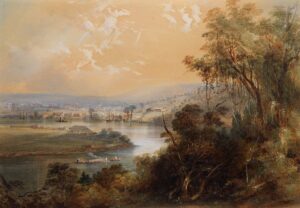Welcome back to the work and fellowship of your professional association, as expressed or symbolised in this very humble e-bulletin. We start a new year.
The next twelve months will be interesting times for us. Most of you will not be able miss the fact that the centenary of World War I is just about to be launch upon the Australian public. I highly recommend that members take a look at the new website called “Honest History .” As a network of our colleagues across the country, the website explains:
“Our military history will take an even higher profile as we approach the centenary of World War I. In the next several years, there will be a special need for both balance and honesty in the way we deal with this part of our history. Honest History will contribute to this process by trying to present the full richness of the tapestry of Australian history, within which the Anzac motif can retain its appropriate and proportionate place. It is not a question of ‘either Anzac or (some alternative single myth)’ but ‘not only Anzac but all of the other important threads of our history.”
That ability to show a fully integrated history to the public is badly needed. We are reminded of this fact with the reappearance of the Australian ‘history wars.’ The Australian Government has begun the process to review the Australian national curriculum, and there have already been the ‘dumbing-down’ responses, saying that one area of history – our national history – should be favoured over another – Asian history. It is the same inability to handle history as a diverse mixture of specialisations and themes – often crossing-over along the way.
And then there was Kevin Donnelly’s comment that “the pendulum has moved too far towards that kind of approach [Aboriginal and Torres Strait Islander histories and cultures; Asia and Australia’s engagement with Asia; and sustainability] and we really need to balance that with an understanding that our political, our legal institutions are derived from western civilisation, so I think children need good grounding in that (The Guardian 15 January 2014).”
The silliness in this “history wars” approach is that my own history specialisation is very much rooted in the theme of western civilisation but the political argument that wants to drive historical themes in one direction or other is, in fact, damaging to a substantive appreciation of “western” history. It is like Prime Minister’s comment that “there are goodies and baddies” and to be able to teach a scholarly course in foreign affairs. With that kind of polemics you are not doing any favours to those who take a stance on international ethics.
It just so happened that when the Australian National Curriculum Review was announced, and the new battleground was marked out, I was reading Bertrand Russell’s History of Western Philosophy. If any historian is an authority on western civilization, it is Russell. But what I find from Russell is that he would not agree with the Donnelly historiographical perspective, and would, in fact, counter that “Asian” history should have its emphasis, as much as any history.
To demonstrate that those who have a passion for “western” history are able to integrate a deep respect for the need to understand history from other cultures, and indeed, to allow it its fair share, I composed this letter mock letter to Kevin Donnelly, based on an extract from the History of Western Philosophy. It is as follows:
Dr Kevin Donnelly
Director
Education Standards Institute
PO Box 228
Balwyn, 3103
Victoria, Australia
20 January 1945 2014
Dear Kevin,
[In my book, History of Western Philosophy,] Our use of the phrase ‘the Dark Ages’ to cover the period from 600 to 1000 [A.D.] marks our undue concentration on Western Europe. In China, this period includes the time of the Tang dynasty, the greatest age of Chinese poetry, and in many other ways a most remarkable epoch. From India to Spain, the brilliant civilization of Islam flourished. What was lost to Christendom at that time was not lost to civilization, but quite the contrary. No one could have guessed that Western Europe would later become dominant both in power and in culture. To us, it seems that West-European civilization is civilization, but this is a narrow view. Most of the cultural content of our civilization comes to us from the Eastern Mediterranean, from Greeks and Jews. As for power: Western Europe was dominant from the Punic Wars to the fall Rome—say, roughly, during the six centuries from 200 B.C. to A.D. 400. After that time, no State in Western Europe could compare in power with China, Japan, or the Caliphate.
Our superiority since the Renaissance is due partly to science and scientific technique, partly to political institutions slowly built up during the Middle Ages. There is no reason, in the nature of things, why this superiority should continue. In the present war [World War II], great military strength has been shown by Russia, China, and Japan. All these combine Western technique with Eastern ideology — Byzantine, Confucian, or Shinto. India, if liberated, will contribute another Oriental element. It seems not unlikely that, during the next few centuries, civilization, if it survives, will have greater diversity than it has had since the Renaissance. There is an imperialism of culture which is harder to overcome than the imperialism of power. Long after the Western Empire fell — indeed until the Reformation—all European culture retained a tincture of Roman imperialism. It now has, for us, a West-European imperialistic flavour. I think that, if we are to feel at home in the world after the present war [World War II] we shall have to admit Asia to equality in our thoughts, not only politically, but culturally. What changes this will bring about, I do not know, but I am convinced that they will be profound and of the greatest importance.
Kind regards,
Bertrand
[Actually an extract from Bertrand Russell. History of Western Philosophy. Routledge Classics. 1946, revised 1996. pp. 372-373]

